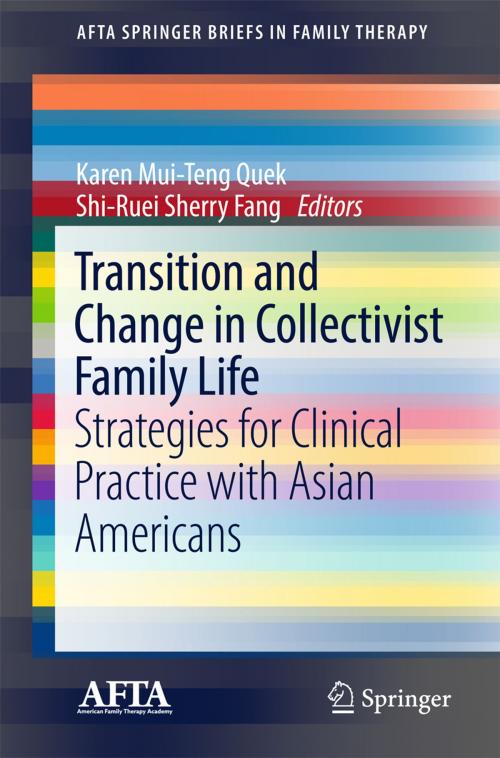Transition and Change in Collectivist Family Life
Strategies for Clinical Practice with Asian Americans
Nonfiction, Health & Well Being, Psychology, Psychotherapy, Social & Cultural Studies, Social Science, Sociology, Medical| Author: | ISBN: | 9783319506791 | |
| Publisher: | Springer International Publishing | Publication: | March 23, 2017 |
| Imprint: | Springer | Language: | English |
| Author: | |
| ISBN: | 9783319506791 |
| Publisher: | Springer International Publishing |
| Publication: | March 23, 2017 |
| Imprint: | Springer |
| Language: | English |
This research-to-practice volume grounds clinicians in a robust, culturally-informed framework for conducting effective therapy with Asian-American couples, families, and individuals. Family, cultural, social, and spiritual dynamics are explored across ethnicities, generations, relationships, and immigrant/citizen experience to reflect a diverse, growing population. Discussion and case examples focus on contrasts, conflicts, and balances involved in acculturation and change, notably the shift from collectivist cultural tradition to a more independent view of the self, gender, choices, and relationships. The contributors’ finely shaded guidance and accessible approach will help therapists provide appropriate services for Asian-American clients without minimizing or pathologizing their experiences.
Included in the coverage:
-
How Asian American couples negotiate relational harmony: collectivism and gender equality.
-
Through religion: working-class Korean immigrant women negotiate patriarchy.
-
The role of Chinese grandparents in their adult children’s parenting practices in the United States.
-
Balancing the old and the new: the case of second generation Filipino American women.
-
Bicultural identity as a protective factor among Southeast Asian American youth who have witnessed domestic violence.
Transition and Change in Collectivist Family Life is a cogent clinical resource for practitioners and mental health professionals with interests in Asian-American family therapy, psychotherapy, collectivism, and faith-based community and counseling.
This research-to-practice volume grounds clinicians in a robust, culturally-informed framework for conducting effective therapy with Asian-American couples, families, and individuals. Family, cultural, social, and spiritual dynamics are explored across ethnicities, generations, relationships, and immigrant/citizen experience to reflect a diverse, growing population. Discussion and case examples focus on contrasts, conflicts, and balances involved in acculturation and change, notably the shift from collectivist cultural tradition to a more independent view of the self, gender, choices, and relationships. The contributors’ finely shaded guidance and accessible approach will help therapists provide appropriate services for Asian-American clients without minimizing or pathologizing their experiences.
Included in the coverage:
-
How Asian American couples negotiate relational harmony: collectivism and gender equality.
-
Through religion: working-class Korean immigrant women negotiate patriarchy.
-
The role of Chinese grandparents in their adult children’s parenting practices in the United States.
-
Balancing the old and the new: the case of second generation Filipino American women.
-
Bicultural identity as a protective factor among Southeast Asian American youth who have witnessed domestic violence.
Transition and Change in Collectivist Family Life is a cogent clinical resource for practitioners and mental health professionals with interests in Asian-American family therapy, psychotherapy, collectivism, and faith-based community and counseling.















